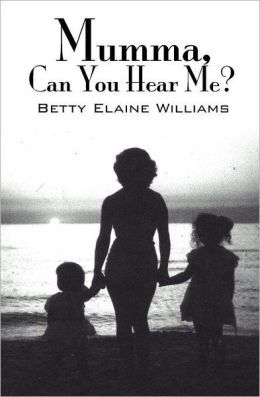Betty Elaine Williams has something to tell us in her memoir, “Mumma, Can You Hear Me?” about how to live a life of meaning. For Williams, it is much to do with faith, not merely spiritual faith, though that is central to her story. She spent 20 years in South America as a missionary, and her Christian faith is a theme throughout her long life, with Williams now being in her eighth decade.
But beyond spiritual faith, her story is about how to hold to the spirit of being joyful and compassionate — always with great and often surprising humor despite severe hardship, dark turnings of events, and the death of loved ones.
Williams was born in Auburn, Maine, in 1927, and grew up for a time in a “children’s home” after her father divorced her mother and “Mumma” had nowhere to live with her five children. Williams hated living there, and always let her feelings be known. Frequently sent to bed without supper, “With no television, radio, or books, I soon developed the skill of making up stories in my head. To this day I do not know if this is a freak thing or a common thing; perhaps it was just a survival skill for me.”
Telling stories is something Williams is good at. Despite the book’s desultory early stories, jumping back and forth in time sequence, which is distracting, once she and her young husband depart for the jungles of Brazil, the trajectory of her narrative runs straight. And story follows story, telling of the challenges she encounters, from delivering babies with little experience, losing her own newborn, endlessly dealing with dangerous snakes — those that crawl and those that carry guns, among a litany of other tales she recounts, often with sharp turns of humor that brighten dark moments.
She writes: “I saw many births and deaths of babies. I heard the loud screams of birthing pains and loud wails from mothers whose babies did not survive.” But she also writes, this time of one of her first birthing episodes, “that it is hard to see the baby coming when the mother-to-be is standing on the bed jumping up and down.”
Williams’s story makes clear that, though she was not a perfect mother — not that there is such a thing — she was always devoted to children. She repeatedly takes in and shelters the unwanted and the wayward, acts of love that often led to adoption, despite a near-constant struggle to keep food on the table and a roof over everyone’s head.
And she is often exceedingly courageous and bold. She goes to college with one of her daughters and earns her degree so that she can become what she felt she was meant to be: a teacher. She goes on to hold two teaching jobs, one during the day and one at night, along with additional opportunities to teach on weekends and mentor struggling kids in both Turner and Rockland.
Betty Elaine Williams’ memoir is a reminder that a good life is not necessarily tallied by the material comforts one obtains, but more importantly by what one gives of the heart to others. Always with good cheer and a sense of humor.
Frank O Smith is a Maine writer, ghostwriter, writing coach, and teacher. He can be reached at:
www.thewritinggroup.com
Send questions/comments to the editors.


